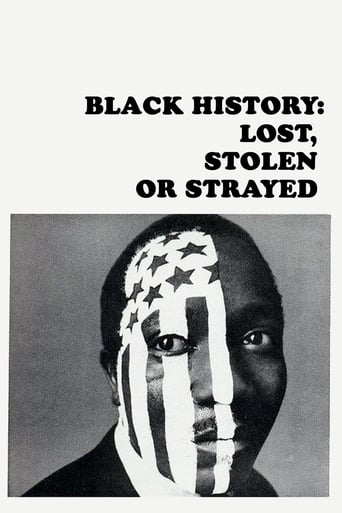

Great visuals, story delivers no surprises
... View MoreA film of deceptively outspoken contemporary relevance, this is cinema at its most alert, alarming and alive.
... View MoreThe story, direction, characters, and writing/dialogue is akin to taking a tranquilizer shot to the neck, but everything else was so well done.
... View MoreThis is a dark and sometimes deeply uncomfortable drama
... View MoreThis is a very poignant documentary that was narrated by Bill Cosby back in 1968. The film is about Black identity and pride and how they have been compromised due to omissions in history books as well as Hollywood's depiction of Black America. Both of these problems essentially boil down to a disdain for Black culture and identity. This film came out in the 1960s when Black Americans were no longer accepting that they were second best--a very positive step in our society.I first saw this film when I was in middle school back in the late 1970s. Sadly, our teacher tried showing it to us because the film had many wonderful lessons but what I remembered most about the film is how the White students laughed at the images of Blacks in films, such as from BIRTH OF A NATION or the antics of Steppin Fetchit. Now, thirty years later I was able to get my own copy of this documentary--no small feat considering how obscure it now is.I was very impressed by this film and liked the overall message. Bill Cosby is a reasonable man but it's also nice to see that at times, he's angry as he talks about the de-humanization of Black men and women in films--with "Aunt Jemima" images, the myth of the "happy slave" as well as the "slow-witted Negro". All this is very poignant and can't help but make his point. If anything, this documentary actually was somewhat gentle in its condemnation of these films--and made no mention of the worst offenders, cartoons (such as the horrible COAL BLACK AND DE SEBBEN Dwarfs).Also seen in the film is some of the counter-reaction to these images in the Black community--such as a school intended to "brain-wash Black kids" (Cosby's words) so they won't buy into the lies that make a Black man any less of a man. Sadly, however, this film was made in 1968 and there is so much to the Black Power movement and the 1970s that couldn't have been covered. In fact, there's so much from the 80s and 90s and today that couldn't be covered. This film is aching to be remade by Cosby, as racism is seen in different forms today and there are still unnecessary divisions in our country that need to be identified and addressed. He's a very, very smart and talented man and I would love to see his take today on what's going on right and wrong between Black and White America.
... View MoreI really enjoyed this documentary. It really makes us realize that due to the fact that most history books (back then especially) were written by white people, that much of the information is one-sided. We hardly get any real or true facts about the African American history. For example, all of these feats were accomplished by an African American: The first open heart surgery First blood bank (developed the technology to do so) Invented the traffic light Processing sugar etc. It's amazing to find out how many inventions that we take for granted that makes our lives comfortable were by African Americans! How do we not know about this?The only thing most people seem to know (if anything) was that George Washington Carver invented peanut butter...
... View MoreI saw this documentary only once, when I was about 8 or 9 years old, and shortly after it came out. I was in second grade, in a segregated school in Houston, Texas. They were in the process of mandating integration in the school, and our teacher showed this to our class. to help us understand why integration was important. I had only seen Bill Cosby before on "I Spy", and had always liked him more than the other characters because he seemed so nice and funny. In this, he was stern and angry, and made an incredible impression on me. I felt ashamed for how whites had treated blacks in America, and vowed then and there that I would do better. I like to think I have. I still think about his righteous anger from time to time. I am amazed that his message made such an impression on me, and that I still remember this piece, almost 40 years later.
... View MoreIf your only impression of Bill Cosby is the funny man from FAT ALBERT, or the kindly Cliff Huxtable from THE COSBY SHOW, this documentary is a revelation. Basically, the filmmakers take you through a history of African-Americans in cinema. Now, this being the late 60's, it is a very ANGRY retrospective, hosted by a very, shockingly, ANGRY Cos. This doc is loaded with really amazing historical footage and some rather shocking footage from the time. The "Black Power" elementary school is a true masterwork. It is a shame that this doc isn't available on home video, because it is a slice of a life and an insight into a time that has been glossed over by the slow drift of history. Call your local PBS station, petition home video distributors, demand that you see this piece! Bill seems so angry in it, that he may scare younger viewers, but it sure seems more 'real,' than the guy who sells you the Jello.
... View More